[ad_1]
Florence, Ky.
Walking through the hallway of a jockeys room is something Perry Ouzts has done thousands of times. Make that tens of thousands.
Seemingly just as much, he has sat down for conversations with reporters. Same ol’, same ol’, right?
“I don’t know what I can add to it,” he said on a rainy Wednesday night this month at Turfway Park. “I’ve been interviewed thousands of times, and it’s the same one.”
Sure enough, the topic has become a familiar one during the past decade or so. But it also has remained no less amazing. At 68, Ouzts is defying Father Time. His 7,337 victories rank sixth in North America and 10th in the world, according to the record keeper Página de Turf. Sixty more wins would put him into the continent’s top five.
As a testament to his durability, Ouzts and Russell Baze are the only North American jockeys who have ridden in at least 50,000 races. Equibase figures said so.
After his 53,578th race, Baze retired in June 2016 at age 57. In the 6 1/2 years since, Ouzts has shown no signs of slowing down. At his current rate, he could get the 840 starts he needs to break Baze’s record in two years. At age 70.
“I don’t think I’ve got enough time left to catch him,” said Ouzts, whose name rhymes with boots and whose ambition as a professional rider simply was to reach 20 years of riding. Now he has reached 50.
“You get up in the mornings, you go and do your work, you go home, take a shower, come back to the track, go home, eat supper, go to bed,” he said. “Wash, rinse, repeat. Been doing it for 50 years, and it’s worked well for me.”
One ride on a damp, windy night
After a drought this year pushed from summer well into fall, the seasons turned on a dime in Northern Kentucky. The calendar might have said autumn, but it felt every bit like a wet, winter night last week at the rebuilt Turfway Park.
While a few hundred patrons were inside the newly christened casino and grandstand, the paddock might have had more puddles than people. A state inspector was there to check lip tattoos on the horses who seemed none the worse for the bleak weather. Trainers and, many times, their stand-ins strolled in with grooms to saddle the horses.
Then came the bright spots. Literally. Jockeys walking out from their quarters in their shiny silks. Their colors exploded against the drab background.
Belying his years, Ouzts looked like one of the gang, taut bodies all with crops in hand. They walked those perfect walks to meet waiting trainers, compare notes and instructions and, because of the rain, get legs up while under the cover of the saddling stalls.
If there were such a thing as new-track smell, Turfway would have it. After Churchill Downs Inc. spent $46 million to buy the place, it spent another $148 million to tear it down and build it back up again. That did not even count the $5.6 million it paid to replace the Polytrack that had been there 15 years and replace it two years ago with a new Tapeta Footings all-weather surface.
“This is a lot better than the old Turfway Park track they had,” Ouzts said. “That one was horrible. It was the worst track I ever rode on in my life because it hurt when it hit you in the face, and horses could not stand it. They would run into it for about a half a mile, and then they would just pack it in.”
On this night, when one of his two mounts was scratched, Ouzts’s only assignment was on J W Ruckus, a 7-year-old gelding who came into the night’s second race 1-for-9 this year and 0-for-13 since 2019 at Turfway. The one win came in August at Belterra Park, where Ouzts had the ride.
J W Ruckus has been in for tags dozens of times, but only once has he been claimed. That was for $8,000 in September by Mark Kuntz. On this night, then, he would be trained for the fourth time by Ouzts’s longtime friend and colleague Larry Smith. The two of them have known each other for more than 15 years and have teamed regularly since 2015.
“Besides being a good rider, he always comes out, and he’s never down,” Smith said. “He’s always got a good attitude. If things go wrong, he’ll say, ‘We’ll get ’em next time.’ He never gets upset. He’s just such a good person.”
Ouzts might have come to Smith late in his career, but he expressed strong feelings about their alliance. Feelings that were in sync with Smith’s.
“My favorite guy to ride for,” Ouzts said. “He is so laid back and so calm and such a good guy to ride for. He never gives you instructions. Never gets mad when the horse runs bad. He’ll say, ‘We’ll take him back to the barn and check him out and see what’s wrong and do better next time.’ ”
Smith has won or shared the last seven training titles 15 miles away at Belterra Park, where Ouzts has spent springs and summers being the top rider 35 times, by his count. That goes back to when the Cincinnati track still was known as River Downs.
“Belterra runs like six months out of the year, and that’s where I usually do the best of my best racing,” Ouzts said. “Here in Kentucky it’s gotten really tough, because they’re starting to give away a lot of money. Horses are getting better, so it’s harder for Belterra horses to keep up. That’s pretty much what I ride the most, so you just do what you’ve got to do. I don’t try to kill myself doing it, you know?”
Arkansas to Chicago to Ohio
Perry Wayne Ouzts is not the only native of the northeast Arkansas town of Lepanto to become a professional athlete. Malik Monk, a guard for the Sacramento Kings, was born there in 1998.
More specifically, Ouzts grew up with his mother, father, two sisters and a brother about five miles away in Rivervale, Ark., population 46. He might be the most enduring sports figure to come out of there, but he is not the most famous. His is not even the biggest horse-racing name to emerge from Poinsett County.
“The Fires boys, Jinks, Earlie and Bucky, they’re my cousins,” Ouzts said, paying homage to the renowned trainer, the Hall of Fame jockey and the professional outrider. “We all lived there in Rivervale. That’s my hometown, and that’s where they’re from. When I graduated from high school, they called me up and asked me if I wanted to come to Chicago, and they’d make a jockey out of me. That sounded like a great job.”
As a teenager Ouzts did not need a lot of convincing to work with horses, because he had been around them as long as he could remember. His size was not an issue. It never has been.
“I was real small, and I liked horses my whole life,” he said. “I thought that would be the best thing in the world. So I went up there to Chicago right after I graduated high school, and they taught me how to gallop and how to work horses. Earlie taught me how to break out of the gate, and how to hit a horse. How to switch sticks. He gave me all the basics.”
After his apprenticeship at Arlington Park, Ouzts returned to Arkansas. Needing work after high school, he spent that first winter as an exercise rider at Oaklawn.
“I was galloping horses for a few guys, and they said they heard of a (trainer) up in Ohio that liked to ride a bug rider (apprentice) all the time,” Ouzts said. “That’s how he liked to run his stable. He asked if I wanted to go up there, and I said sure.”
Not knowing where he was headed, Ouzts set off for Columbus to go to Beulah Park, which would have been 100 years old next year had it not been closed in 2014. By 1973, Ohio’s first Thoroughbred course was not as well known as it once was.
“I stopped at a gas station and asked the guy where the racetrack was,” Ouzts said. “He said, ‘I didn’t know they had a track in this town.’ I got to thinking, ‘What have I got into now?’ ”
It was not long before the Fires brothers put him to work, even though Ouzts said he could have used another nine months to prepare.
“The Fires guys, they said I was ready,” he said. “I did real well. I was the leading rider at the first meet I ever rode at. Maybe they knew a little something. I don’t know.”
Those first starts and wins at age 18 got him hooked. Not only on racing but on Ohio, too.
“I moved from Beulah Park down to River Downs and did real well there, and I just kind of stayed. I never went anywhere else.”
The inner circle is tight
Mention him around Turfway Park, and everyone knows who he is. Not even his full name. Just say Perry, and the nods of recognition are immediate.
“Perry is the definition of both class and tenacity,” said Ashley Holliday, a former outrider who is Belterra Park’s racing specialist. “He’s one of the friendliest people that you could come across in this industry.”
It is true that Ouzts could start a community just with the people who have made his acquaintance in a half-century of riding. He knows everyone from executives to grooms at any given racetrack where he works.
Yet he said there are boundaries to his being social. In an interview when the conversation flowed easily without any awkward pauses, he said relationships have to be limited simply because of the everyday demands of the job.
“You don’t really have many friends on the track,” he said. “You just work so much that you don’t have time after you get done working. You don’t really socialize much.”
It is not like Ouzts is off-putting. Far from it. He simply is dedicated to his craft. To his routine.
“Perry is very focused on his day when he comes to the track,” said Holliday, who has had a wide variety of roles in her five years at Belterra Park. “When he gets in the jocks room, he has a whole routine that he goes through every day. He is very set in his ways as far as that goes. Very concentrated on what’s going on.”
Staying in shape takes up a lot of Ouzts’s time. He said Toni Ouzts, his wife of 38 years, has kept him honest. His lifestyle has kept him young.
“I work out,” he said. “Lift weights. Get on horses every morning, and I think that helps. The reason I get on so many horses is because my wife owns horses. I have to do the galloping for her. She said that’s one of the perks of being married to a jockey.”
Beyond the two of them, horse racing is not a family affair for the Ouztses. Their two sons, Perry said, are more than six feet tall, and they never developed an interest in the game. His core group, he said, is tight.
“I’ve got a few friends that I call my friends,” Ouzts said, “but we don’t hang out much after the races are over or anything like that. I don’t smoke, I don’t drink, I don’t do anything. I don’t hunt, I don’t fish, I don’t golf. I don’t do nothing. I work.”
Well, that was not completely true. Ouzts said he had one thing that kept him occupied when he was not on a racehorse going 40 mph. It was with something that goes even faster.
“I ride my motorcycle for fun,” he said. “That’s it. That’s the only thing I do. … It weighs a lot more than I do. It’s about 750 pounds. It’s about 2,000 cc. It’ll carry you down the road. It’s a cruiser.”
Ten years ago he crashed his motorcycle when a car driver cut him off on a Cincinnati freeway. Despite going 70 mph, he walked away unhurt. As he told Spectrum News in Cincinnati, “It was kind of like taking a spill in a horse race.”
A record of endurance
The statistics don’t lie. Averaging more than 1,000 rides per year, Ouzts has been the model of endurance. Even in 1992, when a training accident landed him in intensive care with fractures to his jaw, nose and shoulder, he still had 1,058 rides.
However, 16 years ago next month at Turfway Park, Ouzts nearly lost his life in an $8,300 claiming race. The horse he was riding was stalking the lead late in a six-furlong claiming race when his front legs buckled. The horse survived, but Ouzts wound up with a broken back and a trampled leg. He missed 11 months of races.
Ouzts not only lived to celebrate that Christmas, he returned to race the following day at Turfway Park. Only four more days passed before he was back in the winner’s circle on a horse who had an appropriate last name. Sunday Blessing.
All the while, Ouzts maintained one important part of his routine, something that has contributed to his longevity.
“I just pretty much know how much to eat every single day,” he said. “That’s whether I’m racing or whether I’m hurt and in rehab, getting ready for the comeback. I eat the same amount of food every day. I never gain any weight.”
Ouzts said his brother and sisters “are probably bigger than me, but they’re not huge.” He said if there was a genetic predisposition that favored his aspirations to be a professional jockey, it was on his mother’s side of the family.
“I’ve never had a weight problem,” he said. “I’ve always weighed the same. I’ve weighed 110 pounds for almost 50 years, within one or two pounds every day. It’s a lifetime thing. I know how much that I can eat and how much that I can’t.
“I get on the scales every day, first thing in the morning. If I’m a pound light, I’ll eat a little more that day. If I’m a pound heavy, I’ll eat a little less that day. I just know how to regulate it. It’s just been a 40-year, 50-year thing.”
Like a NASCAR driver who might not win all the time but also does not wreck his car, Ouzts is a testament to long-term reliability and an uncompromising work ethic.
“He is still on the track in the morning, working and breezing horses in his full, black leather chaps and black leather vest,” Holliday said. “He just sits on a horse so quiet.”
“Why is a jockey his age going to be out here every morning galloping horses?” Smith said. “He doesn’t have to do that. He could ride all he wants to without galloping. He still comes out and gets on horses. He’ll check with my barn every morning. ‘Do you guys need anything?’ Sometimes we do, sometimes we don’t. He’s right there to get on if we need him. He’s always willing to help out.”
Ouzts did not set out to establish himself as the ironman of horse racing. When he started riding for the Fires brothers a half-century ago, his original goal was much more, well, realistic.
“I thought if I could ride for 20 years, that would be awesome,” Ouzts said. “That’d be a really good career. Then I’d do something else. Well then 30 years came by, and I said this is great. If I could go another 10 years it’d be just unbelievable. That came and went, and now this is my 50th year doing it. And it still hasn’t got old.”
Big time is not fun time
The drive down I-71 to Churchill Downs is about 90 minutes from Turfway Park. But in racing reality, it is much further. Ouzts said he was just fine having that be a road less traveled.
“I’ve been to Churchill and Keeneland and rode there and won races and stuff,” he said. “But it was just always harder to win, and I just didn’t enjoy it. I always thought I had the ability if I would have really applied myself. I could’ve probably made a good living doing it there, but it just wasn’t as fun.”
While his win total is tops among active North American riders, Ouzts’s $50,381,403 in purse earnings rank him 100th in the same group. Rarely does he ride in anything but maiden or claiming or allowance races, the quintessence of being the backbone of the sport. The only Grade 1 race on his Equibase résumé was his third-place finish in 2007 on a 24-1 long shot in the Breeders’ Futurity at Keeneland. Wouldn’t you know? That 2-year-old gelding was named Old Man Buck.
Ouzts likened his path to that of Baze, whose dominance in Northern California made the brass ring of Southern California less desirable, even if it might have been more lucrative.
“That’s what he liked doing,” Ouzts said. “He liked winning more than he liked saying he’s riding at Santa Anita and making about the same amount of money. That’s pretty much what I’ve done. Just stayed around Belterra and Turfway and Beulah Park and smaller tracks, because I could do a lot better there.”
For a man who has won 14 percent of his starts, the joy of going to a bigger track comes not when it is the rule but, instead, the exception. The busman’s holiday, to coin an old expression. The horseman’s holiday, to make it more accurate. He experienced that with his wife in the fall of 2014.
“We were going out to California to visit her sister,” Ouzts said. “Her sister asked us, ‘What do you guys want to do when you’re out here?’ I wanted to go to Santa Anita. That’s what I wanted to do and take in a day at the races.”
Ouzts could not merely go as some fan hanging around the rail or in the box seats.
“I said I would like to ride one while I’m out there,” he said. “So I told my agent (Jamie Fowler), and he got on the phone. He called a few guys. Tom Proctor said, ‘Yeah, I’ll put him on one.’ A couple days later he said, ‘I’ve got him on horse in a $100,000 (stakes). Is that a good enough mount for you?’ So that was awesome.”
It turned out it was the Autumn Miss (G3) the week before the Breeders’ Cup. He rode a filly named Wonderfully, who at 47-1 was the longest shot on the board. Breaking from post 9 in a field of 10, she traveled wide and finished last. It was not a win, but that unpressured cameo was pure bliss for Ouzts.
“She didn’t run so good, and she was a long shot, but it was so much fun. He called me, Proctor did, the day before the race. I was already there. He said, ‘Do you want to come out in the morning and get on one and just take in the whole experience?’ I said heck, yeah. I went out there, got on a horse and galloped around there for him.”
The whole time the Ouztses have been married, they have been on maybe five vacations. That visit to Santa Anita might have been the best.
“I got to watch all the Breeders’ horses work,” he said. “It was so cool. I did have a good time. That’s my idea of a vacation.”
Patience grows by the year
It was raining harder just before the starter pushed the button to send the horses on their way in the second race at Turfway. Ouzts’s only mount that raw, windy night was in no hurry to get the lead. J W Ruckus was not that sort of gelding. And Ouzts no longer was that sort of rider.
“I think the first 30 years, I was like a run-and-gun type guy,” he said. “When the gates opened, it was all out, every race, to get to the front and just keep going. Well then, as I got older, I started letting horses do some of the work. I started letting them relax a little bit. I think I became a much better rider later on. Like the last 20 years, I think I’ve done a lot better since then.”
Call it a more laid-back style or maybe the byproduct of getting older. And Ouzts still gets his share of wins. In addition to his titles at Belterra and his 13 at Beulah Park and a couple at Turfway, Ouzts has a long list of stakes-winning horses to his name. None stands out, though, more than one of his earliest.
“I had a little filly when I first started riding, and I had the (apprentice) bug,” he said. “She was a 2-year-old just starting out. I rode her for five years, and I won 25 races on this horse.”
Ouzts’s memory was spot on. Hy Carol was a gray, Victor Benvenuti homebred who started 83 races between 1973 and 1978, winning 25 times with purse earnings of $298,804. Adjusted for inflation, that would be close to $1.4 million today.
“Hy Carol, she was such a nice filly,” he said. “She has always been my all-time favorite horse.”
So many horses have come and gone since. And Ouzts knows he is close to the end of his career. But how close? Remember, this was a man who hoped to get 20 years out of the game. And then 30. And then 40. He may think Baze’s record for starts is out of the question, but who is to say?
His stock answer to the inevitable question is, “I’m going to retire one day. But not today.”
On this particular night, Ouzts kept his 6-1 ride in mid-pack. Going a two-turn mile, he moved forward on the backstretch, but it was nothing compared with odds-on favorite Air Attack, who circled the field to go from worst to first and win by 1 3/4 lengths.
J W Ruckus finished fourth, and there were no takers to make the $8,000 claim. No doubt Ouzts will ride him again one day soon.
As the 11 horses all came back, the jockeys dismounted and took various paths back to their room. Most of them walked under the roof of the saddling stalls to protect them from the intensifying rain. Others went straight from the scale up the track at the finish line and cut diagonally through the paddock.
Ouzts took his time, talking to some of the few folks who braved the nasty weather and stood outside. Some were fans. Small-talking well-wishers. Others were connections. Fellow professionals.
“Perry is one of the most quiet, soft-spoken guys you could meet, but he’s definitely the physical representation of speak softly and carry a big stick,” Holliday said. “Perry is just a fantastic wealth of knowledge. I love to talk racing and just horses with him, in general. He is one of the friendliest people that you could come across in this industry and truly just so dedicated to his art, his craft.”
Finally, carrying his tack, he approached the jockeys room as raindrops glistened in the track lights. He was greeted lastly by Larry Smith, whose wife patiently stood by.
“Hey, let’s get a picture,” Ouzts said to the reporter whose phone camera was working overtime.
After the three of them posed in the dark of the stalls, Ouzts turned to return to the jockeys room where his night began.
Smith said, “We’ll get ’em next time.”
Ouzts replied, “We’ll get ’em next time.”
Adblock test (Why?)
[ad_2]
Source link

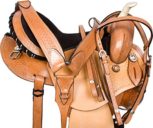

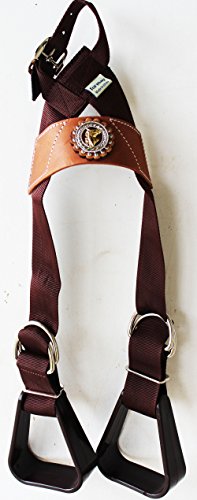


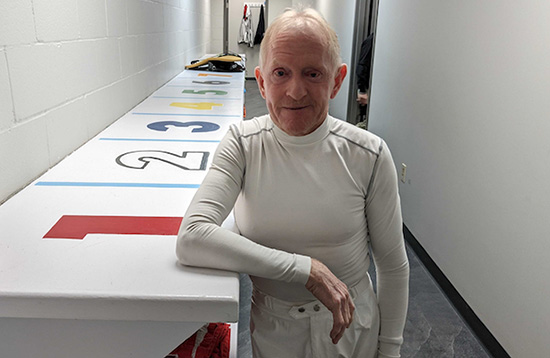

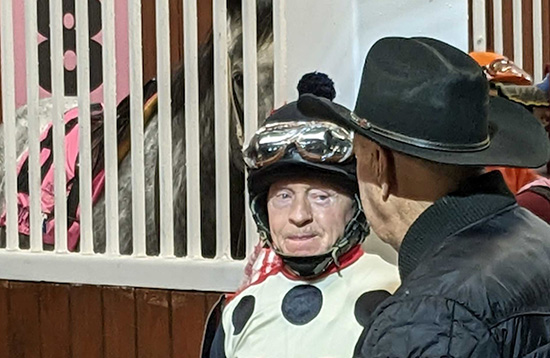
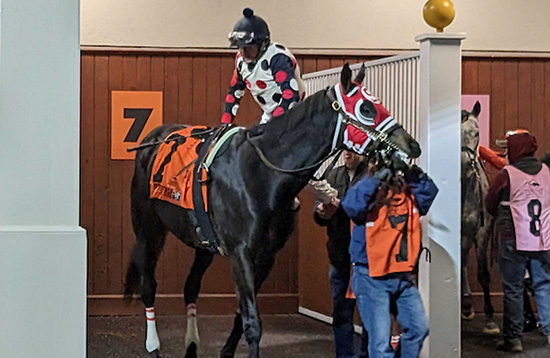
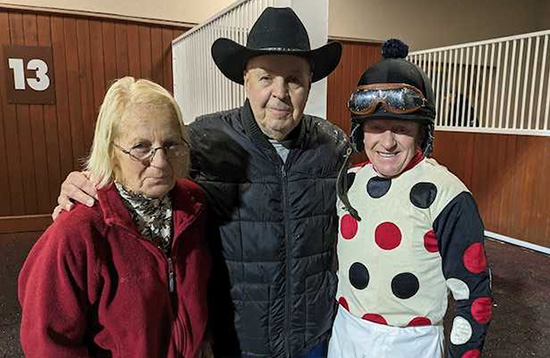
Comments
Comments are disabled for this post.